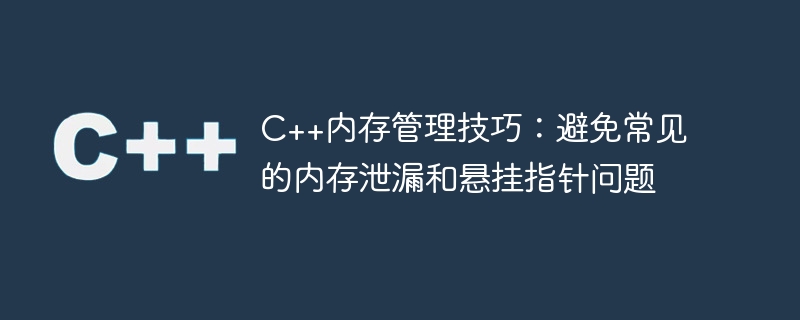

C is a powerful programming language that helps a lot in writing efficient and flexible applications. However, memory management in C is an issue that requires special attention. Improper memory management can lead to memory leaks and dangling pointer problems, which can seriously affect the performance and stability of your program. This article will introduce some memory management techniques in C to help you avoid common memory leaks and dangling pointer problems.
First, let us clarify what memory leaks and dangling pointer problems are. A memory leak refers to a situation where memory is allocated but not released properly, resulting in the memory being occupied invalidly. The dangling pointer problem means that the pointer is not reset after the memory block it points to is released, causing the pointer to become a dangling pointer, which may cause a program crash or other errors.
To avoid memory leaks, first ensure that allocated memory is released. In C, after allocating dynamic memory using the new operator, it should be released using the delete operator. Likewise, arrays allocated using new[] should be freed using delete[]. When operating on allocated memory, care must be taken to ensure that no out-of-bounds access or other operations result in invalid memory references. In addition, you should ensure that dynamically allocated memory is released in a timely manner when it is no longer needed to avoid them needlessly occupying system resources.
The dangling pointer problem often occurs because the pointer is not reset at the appropriate time. After freeing the memory, if the pointer still points to the freed memory block, then the pointer will become a dangling pointer. In order to avoid this problem, the general approach is to assign the pointer to nullptr after releasing the memory. This prevents the program from continuing to use this dangling pointer and causing erroneous behavior.
C also provides a safer way to manage memory, using smart pointers. A smart pointer is an object that simulates the behavior of a pointer and can automatically manage the life cycle of memory. There are two main types of smart pointers provided in the C standard library: shared_ptr and unique_ptr. shared_ptr allows multiple pointers to share the same object and automatically releases the memory when the last reference leaves the scope. unique_ptr is an exclusive ownership pointer, which guarantees that only one pointer can point to the object. When the pointer leaves the scope, it will automatically release the memory.
In addition to using smart pointers, another way to reduce memory management problems is to try to use the containers and algorithms provided by the C standard library. The containers and algorithms in the standard library have been fully tested and optimized to provide safe and efficient memory management. Using the containers and algorithms of the standard library can avoid errors caused by manual memory management and improve the readability and maintainability of the code.
In addition, when writing C code, you should develop good coding habits, including reasonable naming, comments and modular design. Good code structure makes the code more readable and understandable, and reduces the chance of memory management problems.
In actual programming, memory management issues are often complex and cannot be ignored. By following the tips above, we can minimize the occurrence of memory leaks and dangling pointer problems. At the same time, rational use of smart pointers and containers and algorithms provided by the standard library, as well as the development of good coding habits, can help us write more efficient, stable and maintainable C programs.
The above is the detailed content of C++ memory management tips: avoid common memory leaks and dangling pointer problems. For more information, please follow other related articles on the PHP Chinese website!




